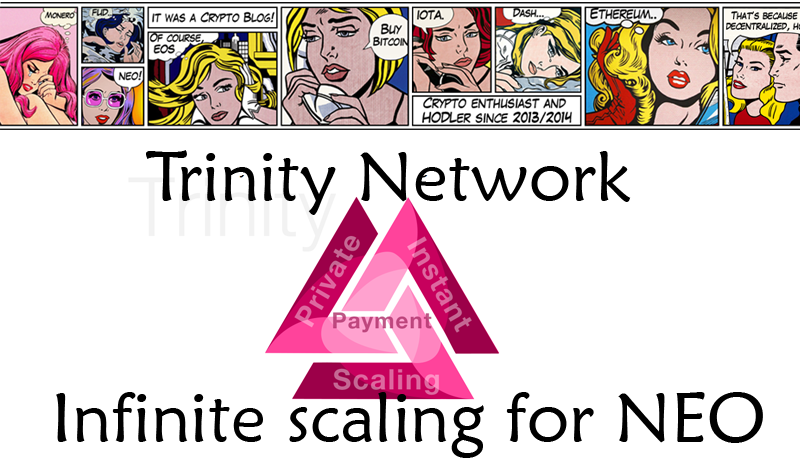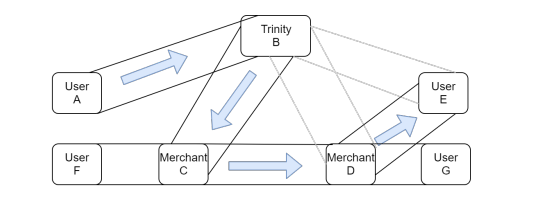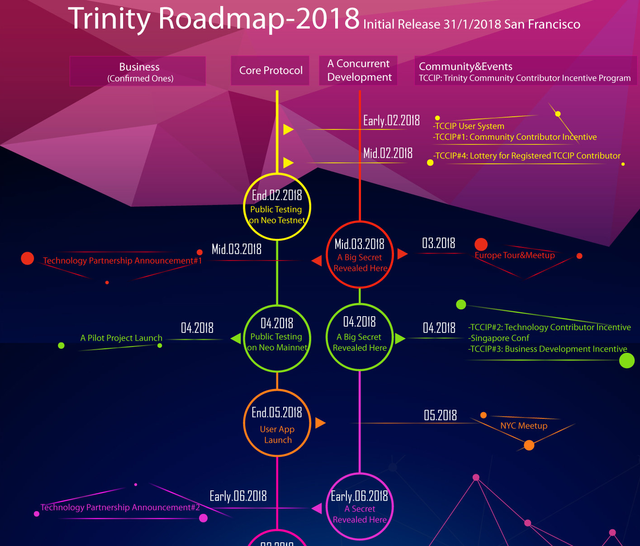Trinity (TNC) State Channels for NEO ⚡ Unlimited scalability and speed for the NEO blockchain

In my eyes 2018 is the year of NEO, and the Trinity Network project is part of why that is the case. Trinity (TNC) is the off-chain scaling solution for NEO, much like Ethereum's Raiden Network or Bitcoin's Lightning Network.

SCALING
Scaling is a huge hurdle for every blockchain, and I firmly believe that no amount of tps will ever be sufficient to handle everything on-chain. NEO has announced that in 2020 it will have 100.000 tps on-chain, which puts it on par with the likes of EOS. Still, 100.000 tps is but a drop in the bucket of what is required.Blockchains aren't just about payments transactions. It's everything from using your blockchain digital identity to log into services, to acquiring game-items in game hundreds at a time (individual transactions, each of them), to blockchain based messaging and much more. Or what about exchanges, who themselves make hundreds of thousands (millions?) of transactions per day by themselves alone. Perhaps you are aware of how many transactions the STEEM blockchain processes - now imagine that platforms like Ethereum, NEO and EOS are looking to create solutions to host an infinite amount of STEEM projects, as well as messaging apps, DEXes, games and everything else. Clearly, even a million tps won't be enough for everything.
The solution to scaling is, therefore, in many cases to 'segment' the transactions and bundle them. There are several solutions in the works, like Ethereum's sharding, but one of the more recent developments is that of the Lightning Network for Bitcoin, Raiden Network (RDN) for Ethereum or indeed Trinity Network (TNC) for NEO.
Trinity uses a technology called 'State Channels' which are akin (identical, really) to Payment Channels. It acts as a ledger between two parties, where transactions take place between them and only the end result is recorded on the blockchain. The similarity of a bar tab is often used and it's not a bad one.
State channels can be used to instantly transact, for free, between two parties. But if multiple parties are linked, they can also settle among themselves.


USE-CASES
People fear the Lightning Network on Bitcoin due to centralization fears, but I feel for platform blockchains this needs to be seen in a different light. Platforms are created for developers to build services on, and not so much for peer-to-peer-payments.A technology like Trinity would for example be very useful for any project looking to create a DEX. It allows this DEX to offer instant and free usage to it's users, and have all of the liquidity in the exchange share the same payment network. This puts zero strain on the main blockchain, while enabling super speed service which we are used to from exchanges.
Another use-case would be for the gaming industry. A game such as World of Warcraft may tokenize it's items, and create internal ways to trade these items. Players would be making thousands of transactions each time they gather, trade or even move an item from one place to another. By setting up a State Channel the game developers could guarantee the necessary speeds to service all the players, and it makes sense from a consumer perspective too: You 'sign up' to a game by setting up a payment channel.
There are many more use-cases, an infinite amount almost, when you think outside of just payments.

TRINITY BENEFITS TO NEO
The combination of Trinity and NEO is an interesting one! Being built on top of NEO offers several advantages. The first being that on NEO transactions are (currently) free, which means that setting up a state channel (or closing it) is also free. This is different from both Bitcoin and Ethereum.Secondly because NEO is already free for small users (most of us), Trinity does not make it more free. In fact, routing your payment through the Trinity Network state channels means you incur a small cost to pay all the nodes you're using the state channels from! That's interesting, considering on other platforms these technologies are heralded for making transactions cheaper, whereas this is not the case for NEO. But I do believe that there is more to this: It is for high volume parties on the network. For example, I could see how one exchange may set up a state channel to another exchange. It is likely that these will become massive hubs for routing traffic. And with the amount of traffic that both of them will generate, it is likely that they will be above the level where transactions on NEO are free. Large corporate parties will therefore benefit from state channel networks, but small consumers probably will not (except in an indirect sense, where services are interconnected through these state channels). It fits with NEO's design philosophy where the user does not pay for the cost of the network.

THE TNC TOKEN
One thing that confused me was the token value proposition. I think this is a very important part of any token, as an investor. And it's hard to determine what is the exact token value proposition, as TNC tokens are not required to set up state channels or use them. You can do that with NEO or GAS or anything else you want on the NEO blockchain. But you can also use TNC. Clearly this is not the token value that I was looking for yet.State channel nodes are rewarded in TNC tokens, is what I discovered. This makes sense, but also means that it is indeed larger players who will be paying the cost for this, and indeed be the ones buying TNC to use the state channel network. It remains to be seen how big of a market this will be, but it is closely tied to how succesful NEO will be.
One interesting use-case for the token is to add extra services to the Trinity Network. For example the whitepaper mentions that it will be possible to pay a small premium fee in order to make transactions private through use of zero-knowledge proof or Coinjoin techniques.
Other services provided by Trinity include QoS, connection-oriented channel routing, thin client gateway services, proxy services on state channel testing and monitoring among other value-added services. God knows what that means, I lack the knowledge for it, but it sounds believable.
So the TNC token is, in my mind, mostly valuable because:
- Big corporations and parties will use it to pay for usage of the Trinity Network (users likely won't)
- TNC will be used to purchase additional services on the network
The token would have a stronger value proposition if it were the sole way of transacting on the network probably, but I have to commend the team on instead choosing the path that makes Trinity the most useful as opposed to the most profitable for traders. After all, it's about creating the best technology and ecosystem - not so much about making the most money for investors. Also, Raiden Network is frequently critiqued precisely for this reason, since they do require the RDN token to be used.
Still, I do think features such as privacy will be in high demand by large corporations who do not want their transactions visible to just anyone, or who have sensitive user data to protect.

THE FUTURE
Trinity looks to be well on it's way to delivering. Their roadmap looks exciting, with public testing on the NEO network planned for Q2 2018 and 'A big Technology Partnership Announcement' shortly after, during what looks to be a European tour (could mean that it's a European partner).About halfway through 2018 the project will actually be usable and by the end of 2018 the roadmap should be complete. That's quite an impressive timeline - considering I'm holding some projects who have been at it for years and have yet to deliver.

I shortened this roadmap due to size, so click here for the full version
There is a working demo too of Trinity, and they are working with the InWe multi-crypto wallet to provide implementation. Below is a video of Trinity State channels and how they work in their current app. It is clear that some user friendliness needs to be added but overall it looks like they are pretty far.

Trinity looks to be well positioned to become an integral part of the NEO ecosphere. It is enjoying a lot of popularity from the community as well, and their setup is more commendable than for example the Raiden Network, which is often accused of attempting a cash grab with their own token. I do believe that Trinity will play an important role in many services that will use the blockchain, ranging from trading platforms to games, social media and messaging, or other highly intensive projects.
Although the token value is at first hard to grasp, I think that is mainly due to our perspective as a small time 'consumer' or user. Many things that we take for granted are in fact highly problematic for corporations and larger parties. NEO is smart in that it makes usage free and easy for users, but hidden behind that are the high costs that companies pay to create services. For example, it costs about $50K USD to launch a smart contract on NEO. Similarly large corporations will foot the bill for Trinity State Channels too. I believe these costs may be significant, moreso than what it appears to us at first glance.
The option to add extra features such as privacy at a cost, are mainly 'extra' income for the network I believe. The main revenue stream should likely come from companies using the state channel network to route millions of transactions to other parties.
What we should also not ignore is the high amount of community enthusiasm and excitement for this project. Trinity seems moreso in vogue than many other NEO-based projects. Many people are expecting Trinity to do very well in 2018.
Currently the market cap sits at $72 million USD, with each TNC priced at about $0.21 each. Trinity (TNC) is traded on Kucoin and Bibox (don't know this last exchange, go to Kucoin if you want it). Since Binance has added the first NEP-5 token recently to their exchange, I think it is likely more NEP-5 tokens such as TNC are soon to follow.
To close this off, I would like to share with you this video interview of Boxming with the CEO of Trinity from a while ago. Although Boxmining at first did not see the necessity of state channels, this talk convinced him of otherwise. It is a bit long but if you are interested in Trinity it is worth watching.
>> To visit the Trinity Network website click here <<



Very informative, thanks. You got my upvoted
You're welcome! Glad you found it helpful!
Awesome! More great information from @pandorasbox. I've seen Trinity on Kucoin but haven't researched yet. Looks like you gave me a huge start on it. Thanks.
Re-steemed as well.
You're welcome, as always!! :)
And thanks a lot for the re-steem, it really helps to reach some people that I otherwise would not be able to reach!
Thank you for the article. I have a slightly off-topic question: What do you think about Narrative? Will you migrate there once it goes live?
Truthfully I only discovered Narrative recently when one of my readers alerted me of it. I haven't looked into it yet but it seems like an interesting project: a Steemit competitor of sorts?
I will likely try it out if it goes live, yes. Not migrating per se, but who knows, I may post my content on both platforms? i mean, why not? :)
By far the best post i've read today, happy to see such a detailed and qualitative information about a topic I didn't really know much about yet. I own some NEO, so it's nice to have some more information about what exactly we can expect of Trinity. Personally i'm no fan of the "Big Secret Here"-moments in the Trinity roadmap though. I think this is stupid propaganda and a bit amateuristic. What do you think about it?
Thanks! That's really nice of you to say, and it gives me a happy feeling inside knowing that my article was actually read, enjoyed and found useful by people!!
I agree the 'Big secret' pre-hype is kind of overdone in the cryptosphere by now. However, if they put it on their roadmap then it probably is not empty hype. I can imagine that they may have already signed up a big partner (like a gaming company, for example) and this partner wants to remain unknown for the time being. Or maybe one of their milestones has to do with a product of some company, and they want to do a joint-press release?
If it turns out to be an empty promise then it is going to hurt the project really bad. But that's exactly why I think the claims of a big secret partnership probably have some merit. At this point in the cryptospace you'd be crazy to screw up your image by hyping lies.
Anyway, it's supposed to be made known in March it seems ,so we will find out about this partnership soon enough!
Man i missed the trinity bandwagon, ''feelsbadman'' this looks very promising, great post btw :)
Thanks!
And I don't think you've 'missed' the Trinity bandwagon at all yet. It's still under the radar for most people and is a really new project, and not listed on many big exchanges yet. At a market cap of $72 million it is by all standards still a small crypto!
This post has received a 2.32 % upvote from @drotto thanks to: @pandorasbox.
This post has received a 0.49 % upvote from @morwhale thanks to: @pandorasbox.